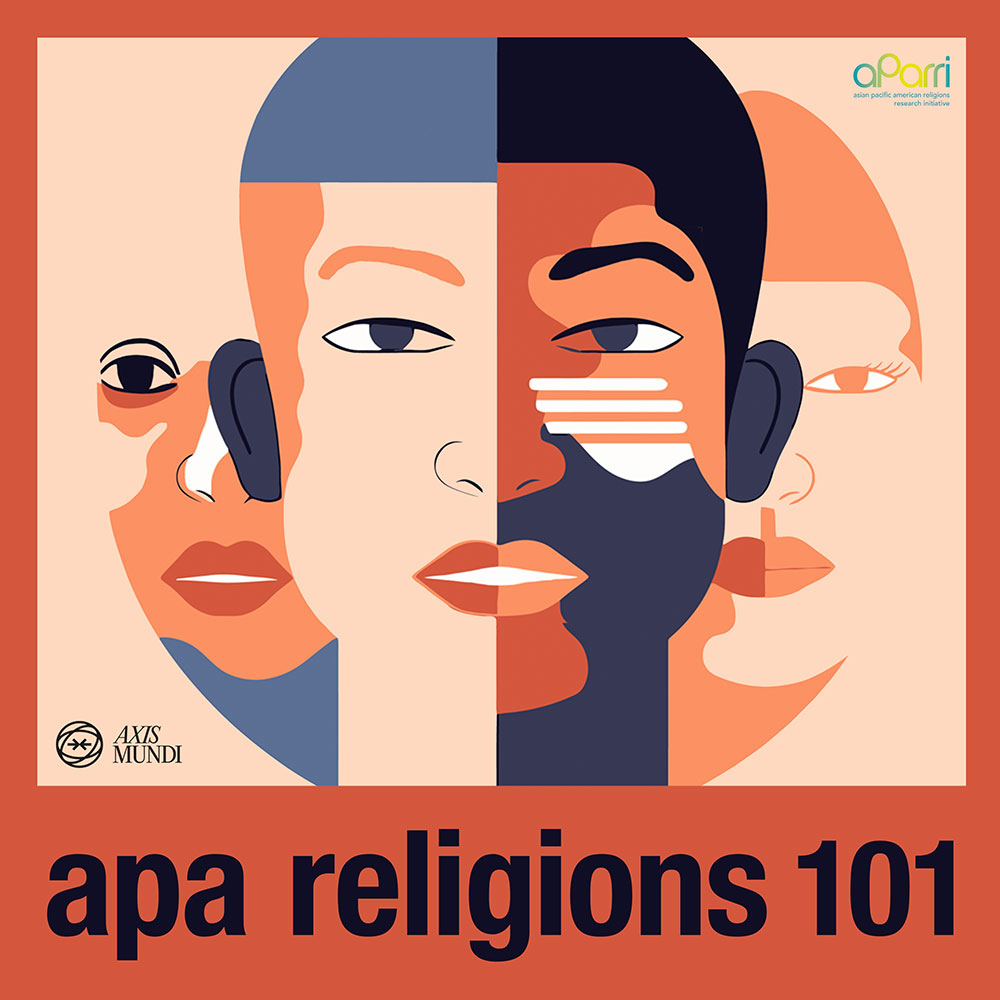
Introduction
An introduction to Asian and Pacific American religions through interviews with experts and practitioners, host Dr. Bradley Onishi speaks with APA scholars about:
This series is a joint venture between APARRI and Axis Mundi Media. The series producer is Dr. Bradley Onishi: @bradleyonishi and the audio engineer and musician is Scott Okamoto: @rsokamoto. For more information about research-based media by Axis Mundi Media visit: www.axismundi.us. Funding for this series has been generously provided by the Henry Luce Foundation.
Japanese, Jewish, Queer, and Clergy with Rev. Laura Cheifetz
Bradley Onishi interviews Reverend Laura Mariko Chaffetz, discussing her experiences as a multiracial queer Asian American Christian minister with Jewish heritage. They examine how APA religious communities navigate the black-white binary in the U.S., the impact of anti-Asian racism during the pandemic, and the dynamics of Christian identity in various contexts. The conversation highlights the importance of recognizing and valuing the diverse and rich religious practices among Asian Pacific Americans
Brad speaks with Dr. Himanee Gupta, Professor in the Department of Historical Studies at SUNY Empire State and the author of “Muncie, India(na): Middletown and Asian America,” about howt South Asians in the United States who grew up in the Hindu faith are caste-privileged or savarna (which means having varna, a term often equated to having spiritual purity). By contrast, Dalits like Soundararajan are avarna (without varna) and thereby deemed within this system as impure. These categorizations have found legitimacy through the promulgation of a Brahmanical form of Hinduism that shares affinities with the conservative pro-Hindu politics of India’s current leadership.
Many wonder how and why religious minorities in the USA adopt conservative – and even fascist – political identities when it seems that the American Right is anti-immigrant and in many cases explicitly racist. Scholars Dr. Jane Hong (Occidental) and Dr. Adrian de Leon (USC/NYU) argue that Asian American (religious) conservatism should be understood not just as an imported phenomenon from outside these communities, but as something structural within the formation of Asian America itself.
Brad speaks with Dr. Gabriel Catanus, Affiliate Assistant Professor of Theology at Fuller Seminary and Director of the Filipino American Ministry Initiative, about the challenges and joys of doing Filipino American theology and ministry and how they fit – and stand out – from other Asian American theological and ministry paradigms.
Brad speaks with journalist and scholar Philip Deslippe about the origins of yoga in the United States as a response to the precarity of South Asian lives in the 20th century America. “A century ago, students of yoga in the United States, like many practitioners today, believed that they were engaging in something pure, ancient, and Indian. In reality, the yoga they were doing was a bricolage of the metaphysical and mundane presented to them in an exotic, Orientalized package by largely educated and worldly immigrants from India. These teachers were themselves responding and adapting to a nativist and racist climate. Yoga in the United States during the interwar decades is one of many examples of how Asian religions in the United States cannot be fully understood outside the context of Asian American history.”
Brad speaks with Dr. Gabriel Catanus, Affiliate Assistant Professor of Theology at Fuller Seminary and Director of the Filipino American Ministry Initiative, about the challenges and joys of doing Filipino American theology and ministry and how they fit – and stand out – from other Asian American theological and ministry paradigms.
Brad speaks with Dr. Simran Jeet Singh , Executive Director for the Aspen Institute’s Religion & Society Program and author of The Light We Give: How Sikh Wisdom Can Transform Your Life.
As a boy growing up in South Texas, Simran Jeet Singh and his brothers confronted racism daily: at school, in their neighborhood, playing sports, and later in college and beyond. Despite the prejudice and hate he faced, this self-described “turban-wearing, brown-skinned, beard-loving Sikh” refused to give in to negativity. Instead, Singh delved deep into the Sikh teachings that he grew up with and embraced the lessons to seek the good in every person and situation and to find positive ways to direct his energy. These Sikh tenets of love and service to others have empowered him to forge a life of connection and a commitment to justice that have made him a national figure in the areas of equity, inclusion, and social justice.
The Light We Give: https://simranjeetsingh.org/the-light-we-give/
Brad speaks with Dr. Martin Nguyen, who explains how his personal story impacts his understanding race, theology, culture, and heritage. As he explains, “It is difficult for me to imagine doing theology, then, without also considering who I am—my being Vietnamese, Asian, American, once Catholic, and now Muslim. Race and religion are entangled in the narrative of my life. They even shape my childhood memories as a son of Vietnamese Catholic refugees, born and raised in Virginia.”
Brad speaks with Dr. Funie Hsu and Chenxing Han about race, heritage, and Asian American Buddhisms. They discuss the ways Asian American Buddhists are often misunderstood in the United States due to the incomplete representation of Buddhism in American culture and the contemporary predominance of Whiteness in Buddhist spaces.